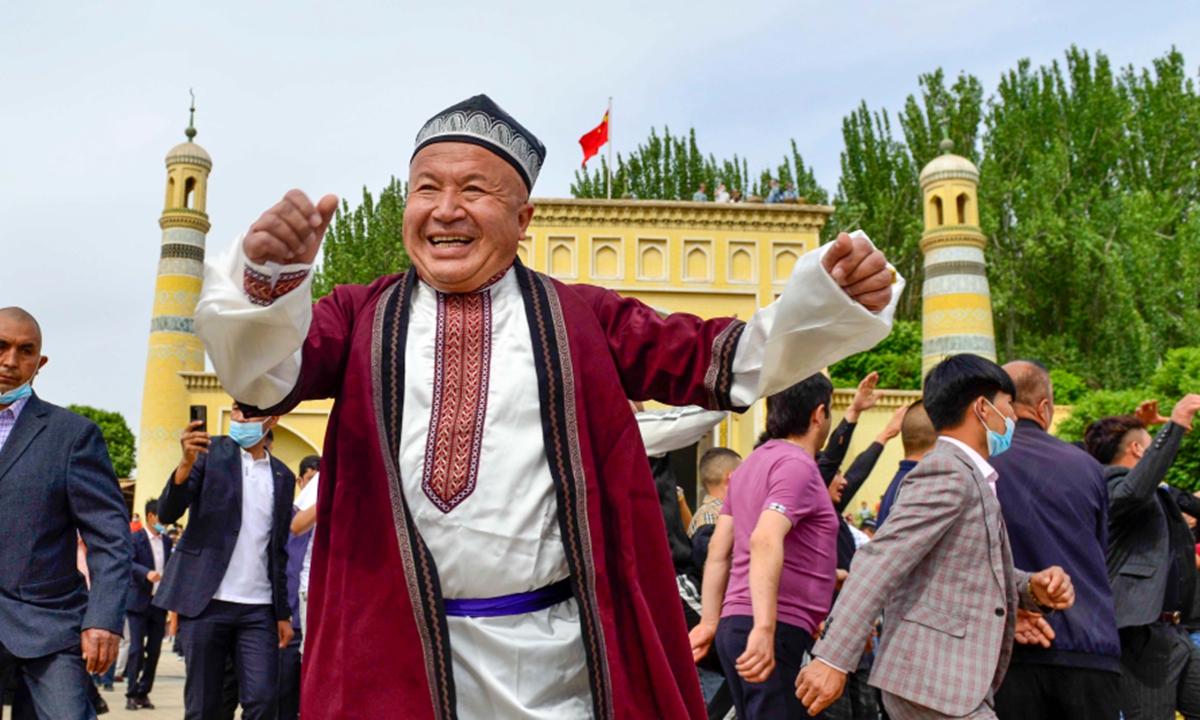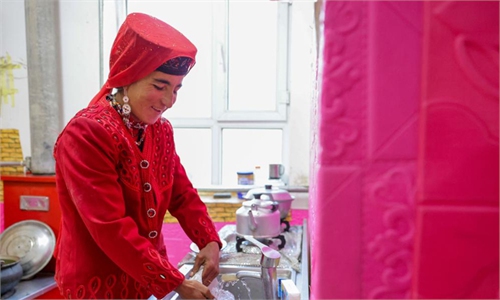Xinjiang invites Muslim residents, imams via video link to debunk disinformation ahead of UN human rights chief’s visit

People dancing in front of Id Kah Mosque in Kashgar to celebrate Eid al-Fitr. Photo: Xinhua
Happily dancing crowds to celebrate the festival of Eid al-Fitr, clean and solemn mosques with Muslims waiting for prayer time, students in the Xinjiang Islamic Institute reading doctrine out loud … these were the scenarios displayed during an online meeting held by the government of Northwest China's Xinjiang Uygur Autonomous Region on Tuesday to show the situation of religious freedom in the region.
This is apparently a vivid debunking of anti-China forces' latest smearing of the region's human rights record ahead of UN human rights chief's visit.
The UN High Commissioner for Human Rights Michelle Bachelet is scheduled to visit China and its Xinjiang region in May, and a delegation arrived in advance in late April and is under quarantine in Guangzhou of South China's Guangdong Province, according to information from the Chinese Foreign Ministry.
Along with the information about the visit comes continuous hyping by some anti-China forces to smear that China is working to make Bachelet's trip for its "propaganda" purpose or to repeat the untenable human rights violation allegations, especially involving Muslims in the region.
Tuesday's online meeting invited foreign media and guests from many countries, and by connecting residents and imams of mosques in different places in Xinjiang region with a video link, it showed the outside world how Muslims in the region celebrated the festival of Eid al-Fitr, which fell on May 3, how they spent Ramadan and whether their freedom of religion had been "violated."
Mamat Juma, the imam of the Id Kah Mosque in Kashi Prefecture of southern Xinjiang, gave an online tour of the mosque via the video link. Before going into the mosque, he pointed at the large square in front of the mosque, recalling the dancing crowds of local residents who celebrated Eid al-Fitr on May 3 while saying "Eid Mubarak!" to each other.
Within the mosque, the imam showed how visitors can get shoe covers from a machine before stepping on the carpet of the prayer room. He showed the air conditioners, water dispensers and facilities for disabled and senior believers.
Abudurekefu Tumuniyazi, head of the Xinjiang Islamic Association and the Xinjiang Islam Institution, also attended the Tuesday meeting via video link and spoke about religious education in the region. He noted that at present, there are 10 religious institutions in Xinjiang, including the Xinjiang Islamic Institute and its eight branches, and one Islamic Scriptures School. They admit nearly 1,000 students every year and have formed a complete Islamic education and training system.
The religious classics including The Koran and The Essence of Buhari's Sermon have been translated and published in Chinese, Uygur, Kazak and Kirgiz, and the channels for religious believers to acquire religious knowledge have been continuously increased, which ensures the healthy and orderly inheritance of Islam.
In Xinjiang, all legal religious activities carried out by religious believers in religious places and in their homes in accordance with religious customs, such as praying, fasting and attending religious festivals, are conducted by religious organizations and religious believers themselves and protected by the law. No organization or individual shall interfere, said Abudurekefu.
Facts speak louder than words. Facing the disinformation spread by anti-China forces about Xinjiang region, Xu Guixiang, the spokesperson of the Xinjiang regional government, said at the online meeting the voices of the residents and imams are the best response.

